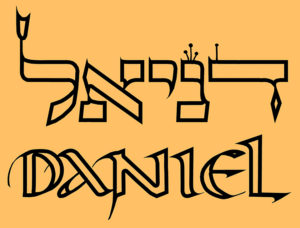What Happens When GOD Names Someone?
When God named someone the few times in Hebrew history, it was associated with greatness and long-term blessings. What does that say about Jesus of Nazareth?
According to the Book of Genesis, God may have named the first man, “Adam,” but he is not recorded as being specifically named by God. “Eve,” on the other hand, was named by Adam.[1] The first persons named by God came not until after the days of Noah.
As a 75-year old man, God instructed Abram to move with his family to the land of Canaan promising “…and in you all the families of the earth shall be blessed.”[2] Faithfully, Abram complied and eventually settled near the city of Salem and the mounts of Moriah.
Abram and his wife, Sarai, decided that due to their old age, the only way for them to have a son was to father a child with Sarai’s servant, an Egyptian named Hagar.[3] Once Hagar became pregnant, both women despised each other placing Hagar in difficult position.
Sarai blamed Abram of creating the situation by making Hagar pregnant. Abram responded by telling telling Sarai that since Hagar was her servant, she could do with Hagar as she wished.
Consequently, Hagar was treated harshly to the point she ran away. God then sent an angel to Hagar telling her to return and obey Saria and then she would be blessed through her son whom God named Ishmael:
Gen. 16:11-13 “And the Angel of the LORD said to her: ‘Behold, you are with child, And you shall bear a son. You shall call his name Ishmael, Because the LORD has heard your affliction…Return to your mistress, and submit yourself under her hand… I will multiply your descendants exceedingly, so that they shall not be counted for multitude.’”(NKJV) [4]
Hagar had given birth to Ishmael when Abram was 86 years old and he lived as part of Abram’s family for more than 13 years until the time came for the next chapter in Abram’s life. [5] Ishmael went on to marry an Egyptian girl and was blessed with 12 sons who would become princes of their tribes.[6]
At the age of 99, God appeared to Abram confirming His promise 24 years earlier.[7] Adding to the promise, the message from God was 3-fold:
Gen. 17:5-6 “No longer shall your name be called Abram, But your name shall be Abraham; For I will make you the father of a multitude of nations. I will make you exceedingly fruitful, and I will make nations of you, and kings will come forth from you.” (NASB)
Gen. 17: 15-16 “…As for Sarai your wife, you shall not call her name Sarai, but Sarah shall be her name. I will bless her, and indeed I will give you a son by her. Then I will bless her, and she shall be a mother of nations; kings of peoples will come from her.”
Gen. 17:19 “…Sarah your wife will bear you a son, and you shall call his name Isaac; and I will establish My covenant with him for an everlasting covenant for his descendants after him.”
 Isaac married Rebekah to whom were born twins, Esau and Jacob. A famine came upon the land and God warned Isaac not to go to Egypt as his father had once done to escape a famine meanwhile assuring Isaac of His blessing:
Isaac married Rebekah to whom were born twins, Esau and Jacob. A famine came upon the land and God warned Isaac not to go to Egypt as his father had once done to escape a famine meanwhile assuring Isaac of His blessing:
Gen. 26:3 “Dwell in this land, and I will be with you and bless you; for to you and your descendants I give all these lands, and I will perform the oath which I swore to Abraham your father. And I will make your descendants multiply as the stars of heaven; I will give to your descendants all these lands; and in your seed all the nations of the earth shall be blessed; because Abraham obeyed My voice and kept My charge, My commandments, My statutes, and My laws.”
Hiding in exile for 20 years because Esau wanted to kill Jacob for stealing his firstborn birthright blessing, Jacob decided to go back home. Before entering the land of Abraham, Jacob’s family camped at a place called Bethel.[8] That night, Jacob wrestled with a Man whom, at the end of the night, said:
Gen. 32:28 “Your name shall no longer be called Jacob, but Israel; for you have struggled with God and with men, and have prevailed.”(NKJV)[9]
Peace came unexpectedly with Esau who actually greeted Jacob with open arms and he decided to settle in the land of Canaan. God later sent Jacob back to Bethel instructing him to build an altar. Returning home, he received another reaffirming message from God:
Gen. 35: 10-12 “God said to him, “Your name is Jacob; no longer shall you be called Jacob, but Israel shall be your name.” … “I am God Almighty: be fruitful and multiply; a nation and a company of nations shall come from you, and kings shall spring from you. The land that I gave to Abraham and Isaac I will give to you, and I will give the land to your offspring after you.”(NRSV)
Gabriel, known in Biblical history as the archangel messenger of God, appeared to Daniel to interpret his visions. Centuries later, Gabriel appeared to Zechariah; to Mary in Luke: then to Joseph in Matthew.[10]
Zechariah was a priest serving in the Temple and was chosen to represent his “division” of priests to burn incense to God. Gabriel later appeared to Zechariah in the Temple and delivered a message from God: Elizabeth would become pregnant and they were to name their son, “John” (later known as John the Baptist).
LK 1:13 “But the angel said to him, “Do not be afraid, Zechariah, for your prayer has been heard. Your wife Elizabeth will bear you a son, and you will name him John.” (NRSV)
Six months later, Gabriel appeared to Mary with a message saying she would miraculously conceive a baby by the Holy Spirit who was to be named “Jesus,” the promised Messiah. Three months later Joseph, her betrothal, received a similar message from Gabriel telling him that Mary’s surprise pregnancy was by the Holy Spirit and the baby was to be named “Jesus”:
LK 1:26-33 “Now in the sixth month the angel Gabriel was sent from God to a city in Galilee called Nazareth, to a virgin engaged to a man whose name was Joseph, of the descendants of David; and the virgin’s name was Mary. And coming in, he said to her, ‘Greetings, favored one! The Lord is with you.’ … ‘Do not be afraid, Mary; for you have found favor with God.’ And behold, you will conceive in your womb and bear a son, and you shall name Him Jesus. He will be great and will be called the Son of the Most High; and the Lord God will give Him the throne of His father David; and He will reign over the house of Jacob forever, and His kingdom will have no end.’” (NASB)
MT 1:20-21 “…behold, an angel of the Lord appeared to him in a dream, saying, “Joseph, son of David, do not be afraid to take Mary as your wife; for the Child who has been conceived in her is of the Holy Spirit. “She will bear a Son; and you shall call His name Jesus, for He will save His people from their sins.” (NASB)
Separate messages from God to both Mary and Joseph instructed each of them to name their baby, “Jesus.” What does this say about the significance of God naming Jesus?
Updated February 18, 2023.
This work is licensed under a Creative Commons Attribution-NonCommercial-NoDerivatives 4.0 International License.
REFERENCES:
[1] Genesis 2:20, 3:20. Edersheim, Alfred. The Life and Times of Jesus the Messiah. 1883. Book II, Chapter 4. <http://philologos.org/__eb-lat/default.htm>
[2] Genesis 12 ; Genesis 12:3. NASB, NKJV, NRSV.
[3] Genesis 25.
[4] CR Genesis 17, 21.
[5] Genesis 16.
[6] Genesis 16, 25; I Chronicles 1. “The 12 Tribes of Ishmael.” Nabatea.net. n.d. <http://nabataea.net/12tribes.html>
[7] “Abraham.” BBC | Religion. 2009. <http://www.bbc.co.uk/religion/religions/judaism/history/abraham_1.shtml> “Analysis: Story of Abraham and His Relevance to Islam, Judaism and Christianity.” NPR. 2018. <https://www.npr.org/programs/totn/transcripts/2002/sep/020924.feiler.html> “Why do so many people have the same names?” Connected Isolation. photo. 2016. <https://2.bp.blogspot.com/-v9_D0TUdo2w/V8MBqiMgC1I/AAAAAAAABII/K5yN7DmpERIVf-1i-Txwkr4jkdPHgss0ACLcB/s1600/names.png>
[8] Genesis 33, 35.
[9] CR Genesis 35.
[10] Luke 1; Daniel 8, 9. “Uriel.” Jewish Encyclopedia. 2011. <http://jewishencyclopedia.com/articles/14606-uriel> “Gabriel (Archangel).” New World Encyclopedia. 2017. <http://www.newworldencyclopedia.org/entry/Gabriel_(Archangel)>

 Jacob’s role in the story of the Messiah includes a specific blessing and prophecy of his own. Before he died, Jacob blessed each of his sons and foretold their future. Specifically for Judah:
Jacob’s role in the story of the Messiah includes a specific blessing and prophecy of his own. Before he died, Jacob blessed each of his sons and foretold their future. Specifically for Judah: As a captured Hebrew lad, Daniel and three other Hebrew boys were chosen to be educated in the school for Chaldeans to serve King Nebuchadnezzar. They would join an eclectic group of royal wise men known as the chakkiym, a cabal that included “the magicians, the astrologers, the sorcerers, and the Chaldeans.”
As a captured Hebrew lad, Daniel and three other Hebrew boys were chosen to be educated in the school for Chaldeans to serve King Nebuchadnezzar. They would join an eclectic group of royal wise men known as the chakkiym, a cabal that included “the magicians, the astrologers, the sorcerers, and the Chaldeans.”